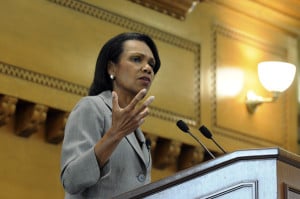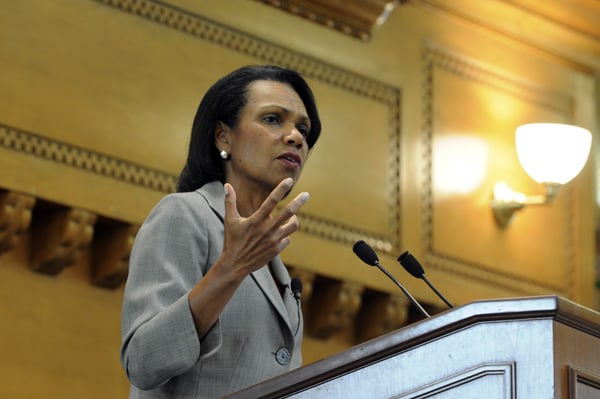
Former Secretary of State Condoleezza Rice spoke Monday morning about the multifaceted nature of Chinese-U.S. relations. Rice emphasized that economic, military and diplomatic relations between the two states hinge upon domestic political reform in China at this critical juncture of possible leadership transitions in both countries.
The event, titled “Finding the Balance in a New Era: Dynamics of the U.S.-China Relationship,” was hosted by the Forum for American Chinese Exchange (FACES) and filled the Bechtel Conference Center in Encina Hall with a crowd largely composed of students.
Rice, a professor of political science and former University provost, began by challenging a mentality that can dominate international relations.
“There is a tendency in foreign policy to want to have a very simple way of thinking about every relationship,” she said. “It’s either an alliance, a relationship of friends or an adversarial one.”
Criticizing this propensity, Rice explained the danger of “zero-sum” views of complex relationships, despite the “comforting” nature of these characterizations. Citing the example of the six-party talks on North Korean nuclear nonproliferation, in which China was a party, she pointed out that relations between large, opposing powers did not have to be adversarial.
Pivoting to the nuances of U.S.-Chinese economic relations, Rice discussed the internal economic policies of the Chinese government. Citing aggressive Chinese expansion into developing markets, undue advantages granted to domestic firms and allegations of currency manipulation, she argued that the Chinese were posturing against U.S. interests.
“There is a feeling that…China [is] on an uneven playing field, vis-a-vis foreign competition,” she said.
Indeed, Rice said that the “the hope had been for a much more cooperative [economic] framework to have emerged” than the status quo.
“We saw the…bullet train of the Chinese economy,” Rice said, explaining the optimism behind China’s rapid growth and entry into the World Trade Organization. “But whether [China] will grow in a cooperative environment is to be seen.”
Finally, Rice declared that the last main determinant of Sino-American relations is domestic Chinese political behavior. She explained that the political repression and opaque rule of law that characterize the Chinese state must be reformed.
“If you want to be an international economy, you can’t tell people to think at work, but not at home,” she said.
But she also complimented China for recent advances in poverty alleviation and economic development. As China continues to grow, Rice warned of potential “political stresses and strains,” because of the rigidity and hierarchy of the political system.
She pointed out that the current Chinese government’s legitimacy is becoming increasingly tenuous, as it has been largely built upon growing wealth and rising standards of living.
“Legitimacy based on prosperity is really, really hard to maintain because expectations are always increasing,” she said. “Legitimacy based on consent must [come to China] soon.”
To conclude, Rice took questions from the audience on topics that ranged from drone strikes to North Korean diplomacy. She often reached back into past experience as secretary of state, but also as a girl growing up in the segregated South. Shying away from the political arena, Rice did not mention the possible ramifications of the upcoming U.S. elections and how different candidates would approach the challenges of Chinese foreign policy.
She closed her talk by offering a word of advice to the Chinese, albeit one ominous in tone.
“My hope is that the [new Chinese] Party Congress will present a reform agenda that is a real reform agenda,” she said. “Every leader that waits too long ends up like Mubarak.”
